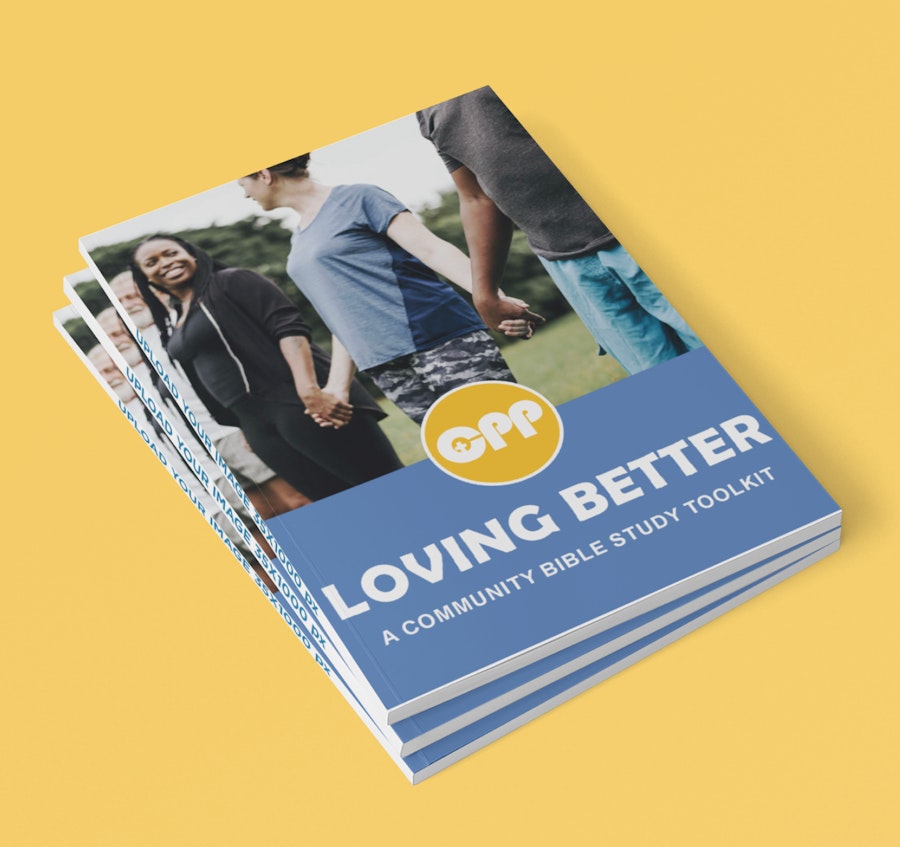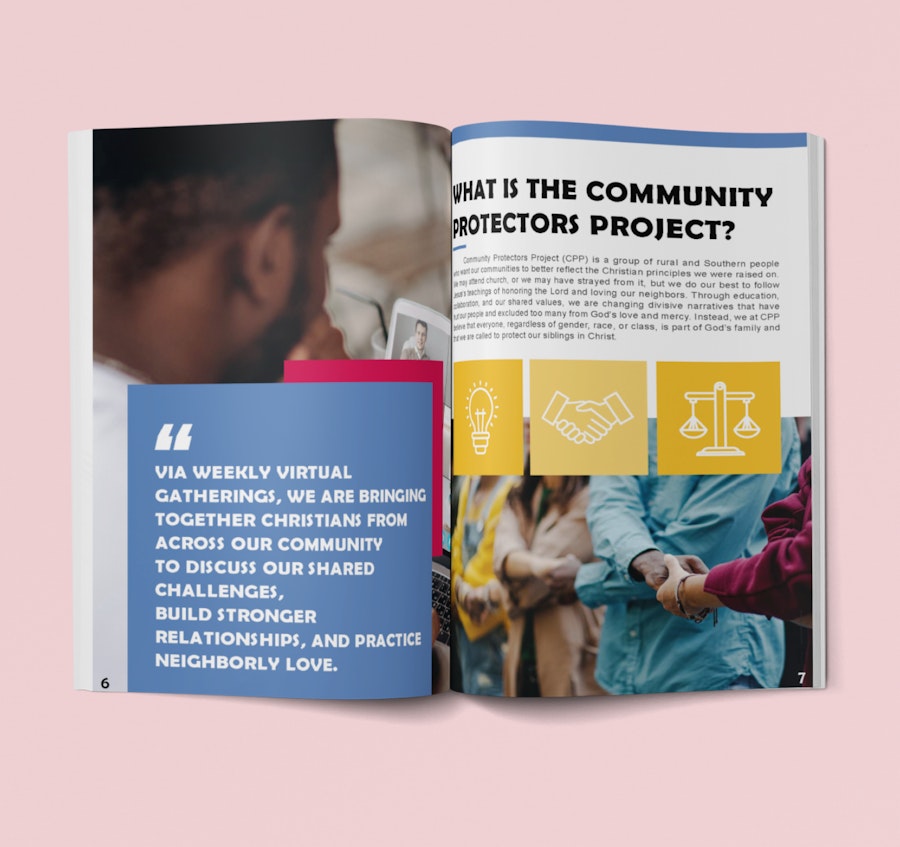Community Protectors Project
Challenging individualistic faith narratives about wealth inequality
The challenge
Across the rural South, Christians are taught variations on the prosperity gospel, which holds that financial success is the result of a strong Christian faith. This narrative ignores systemic issues related to race, class, and privilege that deepen inequality and hinder economic mobility. In their hometown of Gadsden, Alabama, CPP founder Sav Miles wanted to create space for a more communal narrative, one that views poverty as a problem that touches all of us, and consequently calls for collective action and community solutions.
The opportunity
Sav Miles knew that their hometown contained a community of Christians who, like them, felt alienated by some of the Church’s teachings and wanted a more inclusive, open-minded spiritual practice, but didn’t know where to start. So, they teamed up with Rev. Dr. Tommie Watkins, Jr. to design a new Bible study curriculum and community leadership program. This program brought together local Christians to discuss how their faith related to issues like economic mobility, poverty, and racial inequality, shifting away from the individualistic prosperity gospel and toward a community of people invested in collective action.
The approach
CPP explicitly approached their work with an equity lens, seeking to create connections across racial and economic divides. By finding common ground and fostering a sense of interdependence, participants would affirm that poverty was not an individual problem but rather, a call for collective efficacy.
“Community Protectors Project operates as a pipeline through which Christians can get involved in progressive grassroots movements.”
Theory of Change
Theory of Change
A look at CPP’s key objectives, leveraging the theory of change template.
This narrative change project aims to overcome individualist mentalities and misguided theology, to experience the power of story sharing and relationship building, to find common ground and to protect our communities. With it, I hope to shift Christians in Gadsden, AL from believing in the “prosperity gospel” and limiting beliefs to a collective minded alternative, such as “beloved community” - seeing collective action and multiracial cooperation as a path to financial freedom and community development.
I will do this by implementing a three phase program, including community bible studies, a leadership development program, and creating a community council to ideate and execute community development projects. This content will reach my audience via testimonial-style paid social media campaign centering the CPP experience. I will know if I’m successful by participation in our program - and interest from other community leaders in executing the CPP program with their communities.
Project Output
Project Output
The program was broken into three phases—a community Bible study, community organizing classes, and the community council. CPP selected a core leadership group to participate in the community organizing classes, which covered ways of transforming communities through collective action.
The final launch materials included CPP’s downloadable curriculum, their website and social channels, an influencer marketing campaign, testimony videos, and a portrait series featuring program participants.
CPP’s website served as a hub for their work and included a toolkit as well as a call to action to join a Bible study group.
Measuring Impact
Measuring Impact
How they defined success
Honing the core message
After successfully recruiting participants for their program, CPP worked with the Voices for Economic Opportunity Incubator and Grow Progress for engagement testing of their social media content, to learn which types of stories and values would connect with potential future program facilitators. They were targeting their social media campaign toward rural Southern Christians with a collectivist, activist mindset who would potentially lead the CPP program in their own communities. They learned that stories and messages around “coming together” resonated with their audience—not necessarily messages around faith.
Tracking engagement & shifting attitudes
CPP also kept strong data collection on their program attendance and took regular surveys of participants to understand what they were learning, and how they were reacting to the curriculum. This showed a high level of attendance and prolonged engagement, and testimony from participants who discussed making connections across generational lines, rethinking the way they had been taught to view the Bible and their church community, expanding their empathy for historically marginalized communities, and making connections that they wouldn’t have found on their own.
What they achieved
Building a highly engaged community
CPP was galvanized by the high level of engagement and enthusiasm for every phase of their work. They had to place a cap on their Bible study after meeting and then drastically exceeding their goal of 50 attendees per class. What’s more, every single person who was selected to take their community organizing classes for phase two continued on to the third and final phase of the project.
Narrative change
In the words of the CPP team, “[We saw] a shift away from an individualized understanding of poverty, [towards] a deep
desire to act collectively on these issues. Moreover, participants framed project proposals not in terms of ‘helping others,’ but rather as solutions to issues affecting them and their loved ones directly.”
Challenges and Setbacks
Challenges and Setbacks
Messaging
When working with audiences who embrace different values or language, it can be hard to find messaging that will resonate right away. CPP used the word “radical” in early recruitment materials, which prompted backlash in the local community—even though they were using the word in terms of “radical theology” or “radical community.” This backlash drove away their initial fiscal sponsor. They were able to overcome that through organizing and community building, and they found a new fiscal sponsor that was deeply aligned with their mission.
Equity
This team recognized the deep racial and economic divides in their community, and explicitly worked to overcome them. This included developing careful messaging that invited people in, tapping back into shared Christian values, developing a culturally relevant curriculum, and encouraging relationship-building. By focusing on shared values, they were able to build the trust and comfort needed to discuss differing perspectives openly and honestly.
Scalability
The very things that make this program so valuable and engaging, also make it hard to scale. As the program relies on group study and discussion, it requires an extremely high level of engagement from facilitators and participants. Just as important as getting the word out is growing the team’s internal capacity to manage and mediate the program and developing materials to set future facilitators up for success. CPP found great success in their intended impact despite their smaller scale.
Outreach
After building a strong base of participants in their community who held individualist views about wealth inequality, CPP sought to find an audience of more collectively-minded individuals across the South who could potentially step up as program facilitators. It was challenging to find messaging that could resonate with both groups. That said, the team was adept at pivoting strategies to meet their goals. When initial digital communications did not yield as many participants as desired, the team turned to a grassroots one-to-one outreach strategy.
Featured Tools
Featured Tools
Tools that helped advance the project goals.
Creative Brief
Audience Persona + Insights Worksheet
Creative Brief
The brief defines the project and objectives, an important organizing tool for a small and capacity-stretched team that is juggling multiple initiatives and a dual audience.
Audience Persona + Insights Worksheet
This exercise helped CPP define the shared values and characteristics of their audience, and explore the potential differences between workshop participants and facilitators.
Want to explore more narrative change tools?
Lessons Learned
Lessons Learned
The Voices Incubator taught us how to use social media as a tool for building our organization, rather than just a visual representation of our existing work. They gave us all the skills and resources and support we could have asked for to turn our local pilot project into a model for transforming communities across the country.
The team encouraged us to implement two rounds of engagement testing before launching our participant testimony campaign. This shift helped us identify the character, values, and tone that resonate most with our target audience before creating content. For example, we have learned that ‘coming together’ really appeals to [potential workshop facilitators], whereas ads that mention traumatic experiences—even in a positive light—perform poorly.
Definitely a ‘lesson learned’ is that it is important to be conservative with what we are able to accomplish within short time frames. I would rather produce some high-quality outputs than a large quantity of low-quality outputs. We were grateful to our coaches for encouraging us to winnow down our initial proposal.
One thing [CPP] would do differently is include a heavier emphasis on systems in our Bible study and community organizing classes. I don’t think we quite made the connection that local community action around the issues we were discussing was actually the first step in seeking systemic change. Looking back, I would have liked to ask deeper questions in our class breakout groups about the role systems (and those who control them) play in perpetuating the inequality we see in our daily lives.
Hear From
The Participants
Hear from the Bible study participants
They share in their own words how the Bible study impacted them.
With my upbringing, it was just, this is the way, the truth, and the light. This is how it is. But this Bible study gave me an ability to think outside of what I've been taught on the norm. Because a year ago, I would have been just totally against homosexuality. That’s what I was taught, but they are people and they're human, too.
There were several people who were in our community Bible study who had preconceived issues and ideas about other people. But as a result of this study, and as a result of us all being together, I could tell that as the classes went on, they were more at ease, sharing information and talking to other individuals.
Look, no matter who you are, no matter what walk of life you come from … this community Bible study can't help but change your way of thinking. It will change your heart.
Share Insights
Share these insights with your community.
Ready to incorporate these lessons into your work? View, download, and share the PDF of this narrative change case study.

